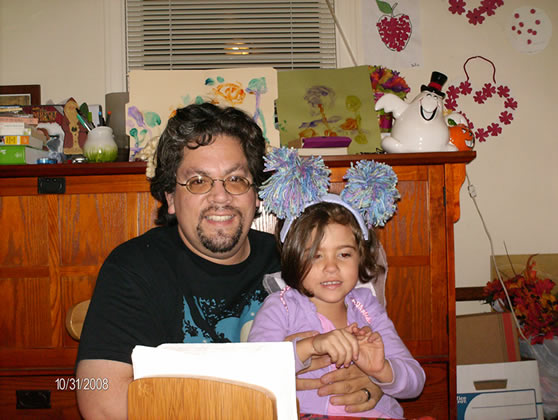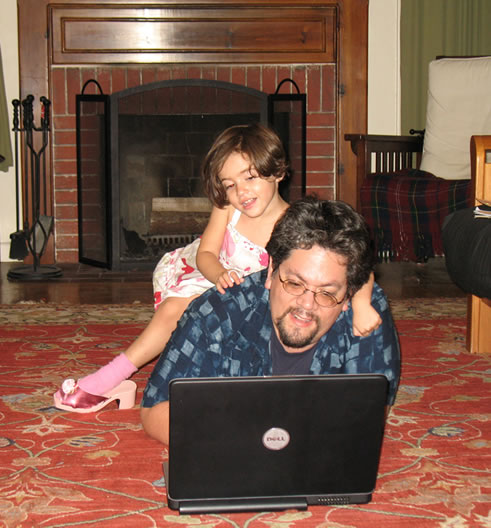
This interview is one I’ve been waiting to do for quite a while. This guy is one of the most financially unsuccessful internet guys I know. At the same time he drives absolutely monster traffic and has a huge amount of influence in the internet world. For millions of people he is an absolute rockstar. His name is Andy Scorcini and his handle is Mr Babyman – he’s the number one poster to Digg, the social news site. He controls a huge amount of traffic volume and IMHO is effectively the leader of the informal network that has developed among Digg’s top users that decide which stories get posted to the site. The number one question Andy and the others is always asked – do they get paid for what they do. We discussed this in detail in the interview.
Full Interview Audio and Transcript
Personal Info
Hobbies and Interests: Movies, Social news submitting, Video games
Favourite Sports Teams: Dodgers and Local LA teams
Favourite books:
- Science Fiction. Authors Philip Dick, William Gibson
Favourite entrepreneurs: Richard Branson, Bill Gates, Steve Jobs, Dean Cayman the Segway inventor
Twitter url: http://twitter.com/mrbabyman
Personal blog: http://thedrilldown.com/
Fast Track Interview
Adrian Bye: I’m really excited to have this interview with Andy Sorcini who is Mr Baby Man from Digg. Normally, we’re talking to CEOs and guys that are running big companies. Andy is someone that can drive a large amount of traffic, probably more traffic than a lot of people on the entire Internet, because of the influence he has on the website Digg.
I am fascinated by Digg, and Andy is one of the leaders in that community. Andy, do you want to tell us a little bit about who you are, where you come from and what you’ve been up to?
Andy Sorcini: By trade, I’m a film editor, and I currently work for a small, independent production company in Los Angeles. Previously, I worked for 15 years with the Disney Company in pre-production and post-production animation.
Adrian Bye: Tell us about how you got started on Digg.
 Andy Sorcini: I came across Digg in a roundabout way. I was a huge fan of TechTV and before that ZDTV – Ziff Davis TV, and a huge fan of the show The Screen Savers. It was a television show that was specifically geared toward the technology enthusiast and didn’t dumb itself down.
Andy Sorcini: I came across Digg in a roundabout way. I was a huge fan of TechTV and before that ZDTV – Ziff Davis TV, and a huge fan of the show The Screen Savers. It was a television show that was specifically geared toward the technology enthusiast and didn’t dumb itself down.
On The Screen Savers, there were several hosts: Leo Laporte, Kevin Rose, and a couple of others. TechTV essentially broke up and became G4. They dropped The Screen Savers as a show, and when they did that, all of the principals went off to do other things outside of broadcast television. What they essentially settled on was podcasts, which I continue to follow.
Kevin Rose came out with the Diggnation podcast. It was through Diggnation that I discovered Digg. I joined Digg and would just read the stories on the site. After awhile, I noticed that it was user-generated content and that anyone could participate. I started looking around the Internet for stories I thought would be interesting to the Digg audience and started submitting those. I think it was my third submission that hit the front page.
Adrian Bye: Are you still the number one Digger?
Andy Sorcini: Yes. I avoid using hierarchal terms like that because Digg itself has removed their list of Top Diggers. Technically according to their data, I still have more front-page stories than any other user, but things shift around. There are different people who have more stories per month or per week. I think I hold the record for the most of all time, but I’m certainly not the number one user on a weekly or monthly basis.
Digg has what’s known as a popularity percentage, and that is essentially the ratio of the number of stories you’ve submitted to the number of stories that have actually hit the front page. By that ratio, I have a 27 percent popularity, which means that less than one-third of the stories that I’ve submitted have actually made the front page.
Adrian Bye: If one-third of the stories you submit goes to the front page, how do you manage to predict that with so much accuracy?
Andy Sorcini: I don’t try to predict it. I just submit the stuff that I feel is the best content and the content that will appeal most to the majority of the Digg audience.
Adrian Bye: I’ve got to ask. What’s your motivation? You obviously spend a lot of time on this. Why do you do it? I assume you’re not getting paid or are you?
Andy Sorcini: No, I’m not getting paid. It’s a hobby for me, but no other hobby that I know of has the fringe benefit of keeping you so well-informed on current events. That’s the one thing about Digg and other social news and networking groups that I know of. It’s amazing how quickly the people who use those sites are informed about current events outside of the general populous.
Adrian Bye: I’m sure you are sending around hundreds of millions of dollars worth of traffic per year. There is value to that. Have you ever accepted any kind of money at all?
Andy Sorcini: No. Not for submitting a story to Digg. First of all, it’s against the terms of service at Digg in particular so I wouldn’t feel right about doing that. I personally wouldn’t feel right about doing it either because it just feels a little slimy to me. I’m not in it to make money from people giving me stories to submit.
I’m offered money all the time. A couple of times a week at least. But if somebody approaches me like that, I tell them right off the bat, “I don’t accept money for this.” I tell them, “I will be happy to take a look at your stories, and if I feel that it’s something that is appealing to the Digg community, I’ll be happy to submit it free of charge.” But nine times out of ten, it’s stuff that is some sort of marketing that the Digg community will see through right away, so I don’t even bother.
Adrian Bye: How much time do you spend each day on Digg?
 Andy Sorcini: I would say between four and five hours. On average an hour in the morning, and the majority of it is at night after my wife and my daughter have gone to bed. Then occasionally during the day if I have a break I’ll log on to Digg, check my RSS feed and see if there’s anything interesting to submit.
Andy Sorcini: I would say between four and five hours. On average an hour in the morning, and the majority of it is at night after my wife and my daughter have gone to bed. Then occasionally during the day if I have a break I’ll log on to Digg, check my RSS feed and see if there’s anything interesting to submit.
Adrian Bye: How do you actually digg? I’ve seen a lot of comments saying, “Mr Baby Man’s using automated tools.” There was a story posted where they were looking at the timings of some of the Digg actions being done and they were completed faster than a human could have done them.
Andy Sorcini: Digg has governors in place to prevent that from happening anymore, so if you try and do that now, you’ll get a popup that says, “You’re digging too fast. Slow down there.” I’ve never seen that popup since they’ve enacted those governors, so I think I’m probably doing it at the right pace.
I do open up stories in different tabs of Firefox, which is my preferred browser, and just click through the stories on each of the tabs. Every single story that I’ve ever done has been me sitting down at the computer and clicking the button.
Adrian Bye: How does it actually work in terms of voting for stories? Are you wheeling and dealing with guys behind the scenes to vote for each other’s stories?
Andy Sorcini: No, nothing really happens behind the scenes. I have added people to my friends list. So I will go through my friends’ stories and select the ones that appeal to me or that I think would also appeal to the Digg audience, but there’s no behind the scenes, no backchannel kind of arrangements.
The other thing that’ll happen is if I am looking at the Digg front page and I notice that I’m seeing a lot of really good stories from a particular submitter, I will add that submitter to my friends list so that I will now be watching their stories as well. Then it’s basically going through my friends list.
There’s also the recommendation engine, which I really like because it gives me the opportunity to see a lot of other submitters that I normally would never have noticed. I’ll find a lot of great stories through those submitters and add friends from within that process as well.
Adrian Bye: What you’re saying is it’s not so much based on relationships but rather more about the content. So are you actually checking every single thing out?
Andy Sorcini: Yes. Well, I’ll be honest with you. I don’t often have the time to check them out in depth, but the same things that appeal to a lot of the Digg users appeal to me, which a lot of times is a very enticing title or description.
I’ve been an active member on Digg since either late 2005 or late 2006. I recognise good content immediately. I can look at the title and the summary in an RSS feed, and I will know immediately whether that story is front-page worthy or not. That simply boils down to experience. Having done it as often as I have, I know immediately just by looking at the summary if that story is worthy of the front page.
It comes from experience and having seen enough of what constitutes good content on the front page of Digg and other social networking sites. I know what that front-page content should look like, and I know how to guide people to get that to happen. I have actually helped other people with crafting content specifically for social networks.
Adrian Bye: Let’s talk about the controversy. There was a period a couple of months ago where everyone was calling you Mr Baby Spam and all of this anti-Mr Baby Man posts were getting voted up. You’re getting really ripped on a lot. Why do you think that so much of the community has turned against you? But yet you still remain a top user. I find that extremely fascinating.
 Andy Sorcini: The majority of the controversy boils down to accusations that I am accepting money for content submitted, and I have never done this. The crazy thing about this is for as many of those accusations that have been railed against me, no one has ever brought up any evidence to prove it. The evidence doesn’t exist because it just does not happen. I don’t accept money for submissions.
Andy Sorcini: The majority of the controversy boils down to accusations that I am accepting money for content submitted, and I have never done this. The crazy thing about this is for as many of those accusations that have been railed against me, no one has ever brought up any evidence to prove it. The evidence doesn’t exist because it just does not happen. I don’t accept money for submissions.
I think a lot of it boils down to a lot of people being surprised at how one, two or a handful of submitters can be so popular on a regular basis. I think they have a hard time figuring out why that’s possible without any sort of artificial influence.
Because the Internet is essentially anonymous, one person can say something and then you have a lot of faceless voices behind them who are like, “Alright, I have nothing to be afraid of for joining in with the criticism because there are no consequences.”
A lot of times, individual negative comments will get voted down. But a couple of times there have been whole negative stories that have been submitted about me. If those stories hit the front page, people will just dog pile on top of those stories because there’s no consequence to it.
There’s no accountability to negativity on the Internet. I think that is a huge dynamic. That is a larger problem than any individual criticism that people have against me or any other submitter. It’s the fact that there’s no accountability for being as nasty as you want to on the Internet.
Adrian Bye: A while ago a group of top users were going to leave Digg. What was actually going on there?
Andy Sorcini: There’s a great misunderstanding in what happened during that incident. That wasn’t about leaving Digg. It was about getting the staff at Digg to be held accountable to certain guidelines. The primary thing we were trying to have happen was to establish a line of communication between Digg administration, staff and users.
There had been a lot of complaints from individual users. A lot of Digg users were coming to me saying, “I’ve been having these issues with Digg. I’ve been writing to Digg and they’re not responding. They’re not communicating with me at all.” I guess they saw me as representative of the Digg community, and they felt like I have a certain amount of influence.
We outlined a series of points of things that we felt were wrong with Digg that we wanted to see corrected. Primarily, the number one thing about that, and the point that I still feel the strongest about, is opening a line of regular communication between Digg administration and its users.
Adrian Bye: Do you have that line of communication now?
Andy Sorcini: No, not quite, but what came out of that conversation with Jay and Kevin was what they call the Digg Town Hall, which was a commitment to have this open forum where they would discuss concerns that the Digg community had on a semi-regular basis. What I was shooting for, what I really wanted, was a regular forum where users can have threads open about certain issues that they have with Digg and expect a response from the Digg administration on a regular, daily basis.
Adrian Bye: You guys made the threat that you were all going to leave the site, right?
Andy Sorcini: There was a series of complaints that we had drafted about what we felt was wrong with Digg. It was me and a group of four or five other people. We had all drafted this letter of complaint with certain bullet points, and I saw a second to the last draft of that letter of complaint.
Then that letter of complaint was published. A Digg submission was made of it, and it was promoted. I never saw the published version until after it was published. That published version included the threat to leave Digg. It was essentially made like a manifesto and there was an ultimatum given.
I was not personally part of the movement to leave Digg. That all happened outside of my knowledge and after the last draft of the letter that I had seen had been approved. There are two or three other people who co-drafted the letter with me that decided they were going to add on the ultimatum, and make it like a revolt and a manifesto.
Adrian Bye: If that threat was real and you guys did leave, what happens in that scenario? Does the site go on as normal or is there some impact on the quality of stories for awhile?
Andy Sorcini: I’ve seen something like that happen. It was after Digg had banned about 80 plus users who had provided quality content to the site. For about a week after those users had been banned, the Digg front page looked pretty miserable. In fact, there were a number of stories that were clearly marketing and spam on the front page, and that was because it was the best content to promote, as all of the other sources of great content had been banned, essentially. I think the Digg process is so robust that it can survive losing a good number of top submitters. The problem, however, from Digg’s standpoint is whether that is really how you want to treat your community.









